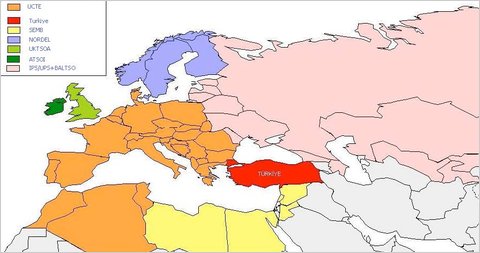Turkey may be frustrated in its bid to become part of the European Union, but by the end of September, it will join Europe’s electric grid.

Most electric systems in continental Europe — including those in countries like Poland and Romania — have synchronized currents, allowing electricity to flow easily from country to country. But other nations, including Great Britain, Norway, Sweden, Finland and until now, Turkey, have remained separate.
Turkey has been trying to connect for 10 years. Like Europe, it uses an alternating current, with the electrons dancing back and forth 50 times a second, but its system has been out of phase with the European grid.
Now, after extensive work by General Electric to enable Turkey’s system to connect, the country will join up for a one-year trial, according to theEuropean Network of Transmission System Operators for Electricity.
The synchronization will include careful monitoring of the alternating current around Turkey and the ability to remotely monitor and control power plants — or even to dump electrical load – if Turkey’s phasing strays too far from Europe’s. If the marching bands start to disagree altogether, the systems can separate again.
Turkey’s electric links run to Bulgaria and Greece, and they have recently been upgraded to carry more energy. A result will be one of the largest interconnected grids in the world, said Luis M. Perez, a General Electric engineer involved in the project.
The join-up also has potentially positive implications for the environment, Mr. Perez said in a telephone interview from Spain.
Turkey, he said, has a lot of hydroelectric projects. In a wet year, it may have more hydro power than it can use; now that power can be exported. And as Europe adds intermittent renewable sources, like wind and solar, a hydroelectric system can function as a convenient shock absorber, throttling back or starting up very quickly to offset variations from other power sources.
Synchronizing with Europe also has positive economic effects, because it will improve the stability of the Turkish grid, according to G.E. The company would not disclose the cost of its work there.
At some point, a technician will enter some keystrokes on a computer, and some electrical switches will move and make the connection to Europe. G.E. is not saying exactly when that join-up will take place.
The Newyork Times
